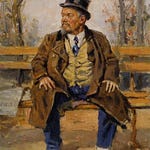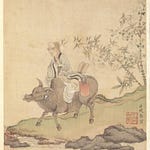Greetings Readers,
Here is the latest Monday Muse with an audio meditation from the Dying Every Day series, a perennial reminder, insight, reflection, and a recommendation to consider. Be wise and be well this week!
💀 Dying Every Day
The Dying Every Day series delivers audio meditations on the art of living. Each meditation provides a quote, a selected passage (from an original Stoic text), and a daily exercise to contemplate.
“Not the longest life is the best, but the best-lived. For it is not the one who has played the instrument the most or made the most speeches or piloted the most ships, who is commended, but the one who has done these things well.”
—Plutarch, Letter to Apollonius
Selected Reading
In this meditation, we turn to a selected reading from Seneca exploring the notion of becoming better.
You must go to the scene of action, first, because men put more faith in their eyes than in their ears, and second, because the way is long if one follows precepts but short and helpful if one follows patterns.
Cleanthes could not have been the express image of Zeno if he had merely heard his lectures; he shared in his life, saw into his hidden purposes, and watched him to see whether he lived according to his own rules. Plato, Aristotle, and the whole throng of sages destined to go each his different way derived more benefit from the character than from the words of Socrates. …
Therefore, I summon you, not merely that you may derive benefit, but that you may confer benefit, for we can assist each other greatly.
No good thing is pleasant to possess without friends to share it.
— Seneca, On Sharing Knowledge
—
Daily Exercise
Consider reflecting on the art of becoming better. What does it actually mean to improve oneself? How might the project of becoming better influence (and be influenced by) those around you?
📌 Perennial Reminder(s)
For Epicurus, all humans have needs — the frailty is the point. Mutual protection and shared values allow friends to acquire both security and joy on equal terms. Paying attention to the essential features of Epicurean friendship can help us identify good friends and be better friends. …
At root, we know that a good friend is a reliable friend and that we fail our friends if we ignore their genuine needs. When we deliberate about how to spend our time, then, our default setting should be to prioritize friends. When offered a choice between time with friends and an inconsequential waste of time, choose friends. […]
Source: Living for Pleasure by Emily Austin (Listen on In Search of Wisdom)
💡 Perennial Insight(s)
Spirituality means waking up. Most people, even though they don’t know it, are asleep. They’re born asleep, they live asleep, they marry in their sleep, they breed children in their sleep, they die in their sleep without ever waking up. They never understand the loveliness and the beauty of this thing that we call human existence. You know, all mystics—Catholic, Christian, non-Christian, no matter what their theology, no matter what their religion—are unanimous on one thing: that all is well, all is well. Though everything is a mess, all is well. Strange paradox, to be sure. […]
Source: Awareness by Anthony de Mello
🛋️ Perennial Reflection(s)
This week’s passages reminded me of an interview with the Jamaican reggae singer and songwriter Bob Marley.
The reporter asked Marley, ‘Are you a rich man?’
Marley paused and clarified, ‘When you say rich, what do you mean?’
The reporter responded, ‘Do you have a lot of possessions? Do you have a lot of money in the bank?’
Marley asked rhetorically, ‘Do possessions make you rich? I don’t have that type of riches, my riches is life forever.’
What does it mean to be “rich” in life? How does your answer connect with the project of becoming better?
Once we have answers to these types of questions, we can begin to work with our desires. To desire what truly matters (and avoid what doesn’t).
📖 Perennial Reader(s)
This week’s recommendation is On Desire (2005) by William B. Irvine (a previous podcast guest). Irvine’s book embarks on a wide-ranging tour of our impulses, wants, and needs, showing us where these feelings come from. He includes observations from writers like Seneca, Tolstoy, Buddhists, saints, etc. Irvine concludes that the best way to attain lasting happiness is not to change the world around us or our place in it — but to change ourselves.
“When it comes to desiring, we are all experts. If there were an Olympics of desiring, we would all make the team. Sickness and old age may change what we desire, but they do not stop us from desiring.”
— William B. Irvine, On Desire
—
Thank you for reading/listening; I hope you found something useful.
Until next time, be wise and be well,
J.W.
P.S. If you’re interested in becoming a member but cannot afford it, feel free to request a complimentary membership or use this discount link.















The Art of Becoming Better, Friendship, and Waking Up